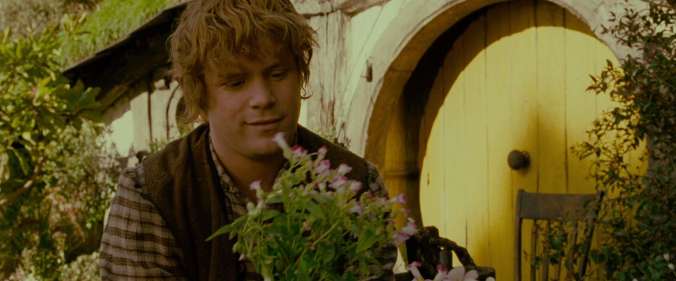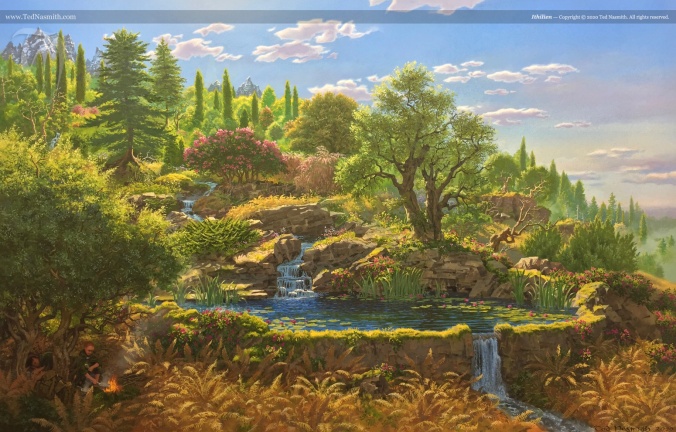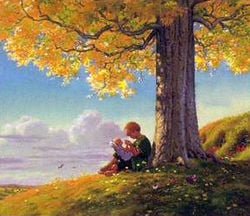The Two Towers by J.R.R Tolkien (Harper Collins 1991, 2007) pp. 891,892
Faramir knows that Frodo’s secret is the very Ring of Power. He does not yet know Frodo’s mission, that he has been given the task of casting the Ring into the fires of Mount Doom, but he wonders at this little folk who now keep it.
“If you took this thing on yourself, unwilling, at other’s asking, then you have pity and honour from me. And I marvel at you: to keep it hid and not to use it. You are a new people and a new world to me. Are all your kind of like sort? Your land must be a realm of peace and content, and there must gardeners be in high honour.”

Gardeners are held in honour in the Shire.
“Are all your kind of like sort?” Faramir asks. The true answer is that just as Faramir is exceptional within Gondor so too are Frodo and Sam within the Shire. Neither are typical of their kinds although there are many good men in Gondor and good hobbits in the Shire. What is providential is that these great ones have found one another in a hostile land and at this critical moment in the story. Within this providential context even Sam’s mistakes, from his negligent care of a smoking fire to his revealing of the true nature of the burden that Frodo bears, only lead to good. Faramir puts this in a different way. Sam was “fated” to stumble, to make such good mistakes and so to aid his master’s mission the better. Later his interventions will be of the most heroic kind.
For a long time when I have read this passage I assumed that the reference that Faramir makes to the high honour in which gardeners must be held in the Shire must have been a gentle joke on Tolkien’s part. When we remember that the very first scene in The Lord of the Rings is set in the Ivy Bush on the Bywater Road near Hobbiton in which Gaffer Gamgee expresses his hope that “no harm” will come of Bilbo teaching Sam to read and write, to “learn him his letters”, it is hard to believe that greatness can come of this family of gardeners at least.
But woven into the rest of the story are very different references to gardens and to gardeners. Galadriel’s gift to Sam, so carefully put together, comes with her recognition that it is Sam, the gardener, who will have to heal his land after the ravages of Saruman there. “Though you should find all barren and laid waste, there will be few gardens in Middle-earth that will bloom like your garden, if you sprinkle this earth there.” Treebeard tells Merry and Pippin of the Entwives who were tenders of gardens and how they would love the Shire if they were to find it. And perhaps most telling of all, Faramir himself was given the task, by Aragorn, of healing the land of Ithilien after the ending of the war of the Ring and so himself became a prince of gardeners.

Ted Naismith beautifully evokes the wild garden of Ithilien.
There is a gardener within the soul of this Captain of Gondor that recognises a kindred spirit in the soul of Sam Gamgee even as he recognises greatness within Frodo’s soul. Faramir, like Sam, will become a healer of the hurts of Middle-earth after warfare is ended and, like Sam, he will tend a garden. Galadriel’s gift to Sam will keep the memory of Lothlórien alive within Middle-earth and Ithilien too will be a blending of wild woodland and cultivated lands, a marriage of Ents and Entwives just as the land that Galadriel made was such a marriage.
Tolkien was drawing upon the memory of Eden in his following of this theme in The Lord of the Rings. Eden is the garden in which everything is in perfect harmony and humankind is connected with itself, with the land and with the divine presence. There is no abuse or exploitation here. There is much more than mere cultivation here and so the Gaffer cannot be a perfect example of a gardener. It is Sam with his internalisation of all that he has seen upon his journeys, especially in Lothlórien, who will subcreate Eden in Middle-earth, or at the very least, a glimpse of it, and so draw his fellows into a delight in what is good, beautiful and true.

Ted Naismith gives us a land at peace with itself in his beautiful depiction of the young mallorn tree in the Shire